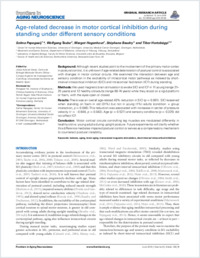Age-related decrease in motor cortical inhibition during standing under different sensory conditions
- Papegaaij, Selma Center for Human Movement Sciences, University of Groningen, University Medical Center Groningen, Netherlands
- Taube, Wolfgang Movement and Sports Science, Department of Medicine, University of Fribourg, Switzerland
- Hogenhout, Margot Center for Human Movement Sciences, University of Groningen, University Medical Center Groningen, Netherlands
- Baudry, Stéphane Laboratory of Applied Biology, Faculty for Motor Sciences, Université Libre de Bruxelles, Belgium
- Hortobágyi, Tibor Center for Human Movement Sciences, University of Groningen, University Medical Center Groningen, Netherlands - Faculty of Health and Life Sciences, Northumbria University, Newcastle Upon Tyne, UK
-
2014
Published in:
- Frontiers in Aging Neuroscience. - 2014, vol. 6, p. 126
English
Background: Although recent studies point to the involvement of the primary motor cortex in postural control, it is unknown if age-related deterioration of postural control is associated with changes in motor cortical circuits. We examined the interaction between age and sensory condition in the excitability of intracortical motor pathways as indexed by short-interval intracortical inhibition (SICI) and intracortical facilitation (ICF) during standing.Methods: We used magnetic brain stimulation to evoke SICI and ICF in 11 young (range 21–25 years) and 12 healthy old adults (range 60-74 years) while they stood on a rigid platform or foam, with the eyes open or closed.Results: There was an overall age-related 43% reduction in SICI (p = 0.001). SICI lessened when standing on foam in old (31%) but not in young (1%) adults (condition × group interaction, p = 0.049). This reduction was associated with increases in center of pressure velocity (r = -0.648, p = 0.043). Age (p = 0.527) and sensory conditions (p = 0.325) did not affect ICF.Conclusion: Motor cortical circuits controlling leg muscles are modulated differently in healthy old vs. young adults during upright posture. Future experiments will clarify whether this difference mediates impaired postural control or serves as a compensatory mechanism to counteract postural instability.
- Faculty
- Faculté des sciences et de médecine
- Department
- Département de Médecine
- Language
-
- English
- Classification
- Biological sciences
- License
-
License undefined
- Identifiers
-
- RERO DOC 213294
- DOI 10.3389/fnagi.2014.00126
- Persistent URL
- https://folia.unifr.ch/unifr/documents/303722
Statistics
Document views: 118
File downloads:
- pdf: 199
